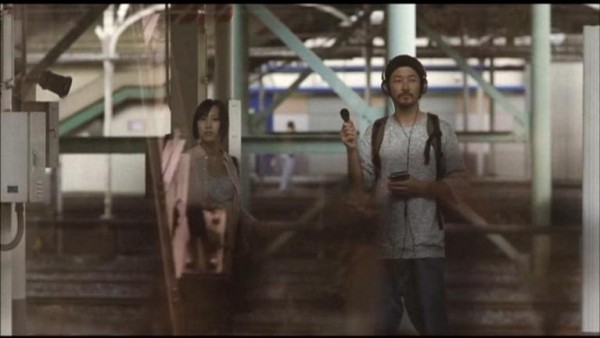CAFÉ LUMIERE (COFFEE JIKOU) (Hou Hsiao-hsien, 2004)
Film Society of Lincoln Center
144 and 165 West 65th St. between Eighth Ave. & Broadway
Wednesday, December 4, Francesca Beale Theater, 4:30, and Tuesday, December 10, Walter Reade Theater, 5:00
Series runs December 4-12
212-875-5050 / 212-875-5166
www.filmlinc.com
 Taiwanese auteur Hou Hsiao-hsien pays tribute to master filmmaker Yasujirō Ozu’s centenary with Café Lumiere, a beautifully lyrical yet elegantly simple drama about a young woman making her way through life. Pop star Yo Hitoto stars as Yoko, a woman who spends much of her time riding trains and trolleys to visit bookstore owner Hajime (the always excellent Tadanobu Asano) and to find out more about Chinese composer Jiang Wenye. She also returns home to her stepmother (Kimiko Yo) and father (Nenji Kobayashi); the latter doesn’t react when he finds out that Yoko is pregnant and does not intend to marry her boyfriend. In fact, there are barely any emotional reactions at all, although there are plenty of trains taking the characters where they seemingly want to be. Cinematographer Lee Pingping shot Café Lumiere on location with natural sound and lighting; his camera often lingers statically on a scene as the characters walk in and out of the carefully composed frame and are heard off-screen, in long takes, furthering the illusion of reality — mimicking the truth Ozu strove for in his work. In essence, the film has no beginning, no middle, and no end; it is 104 dazzling minutes in the life of a fascinating woman and her friends and relatives. Café Lumiere is screening December 4 at 4:30 and December 6 at 7:30 as part of the Film Society of Lincoln Center festival “Ozu and His Afterlives,” which honors the 110th anniversary of the master filmmaker’s birth and the 50th anniversary of his death; he died on his birthday at the age of sixty in 1963. The series features Ozu’s An Autumn Afternoon and Equinox Flower in addition to seven works that were either directly or indirectly inspired by Ozu and his unique style, including Hirokazu Kore-eda’s Still Walking, Jim Jarmusch’s Stranger Than Paradise, Aki Kaurismäki’s The Match Factory Girl, Claire Denis’s 35 Shots of Rum, Pedro Costa’s In Vanda’s Room, and Wim Wenders’s Tokyo-Ga.
Taiwanese auteur Hou Hsiao-hsien pays tribute to master filmmaker Yasujirō Ozu’s centenary with Café Lumiere, a beautifully lyrical yet elegantly simple drama about a young woman making her way through life. Pop star Yo Hitoto stars as Yoko, a woman who spends much of her time riding trains and trolleys to visit bookstore owner Hajime (the always excellent Tadanobu Asano) and to find out more about Chinese composer Jiang Wenye. She also returns home to her stepmother (Kimiko Yo) and father (Nenji Kobayashi); the latter doesn’t react when he finds out that Yoko is pregnant and does not intend to marry her boyfriend. In fact, there are barely any emotional reactions at all, although there are plenty of trains taking the characters where they seemingly want to be. Cinematographer Lee Pingping shot Café Lumiere on location with natural sound and lighting; his camera often lingers statically on a scene as the characters walk in and out of the carefully composed frame and are heard off-screen, in long takes, furthering the illusion of reality — mimicking the truth Ozu strove for in his work. In essence, the film has no beginning, no middle, and no end; it is 104 dazzling minutes in the life of a fascinating woman and her friends and relatives. Café Lumiere is screening December 4 at 4:30 and December 6 at 7:30 as part of the Film Society of Lincoln Center festival “Ozu and His Afterlives,” which honors the 110th anniversary of the master filmmaker’s birth and the 50th anniversary of his death; he died on his birthday at the age of sixty in 1963. The series features Ozu’s An Autumn Afternoon and Equinox Flower in addition to seven works that were either directly or indirectly inspired by Ozu and his unique style, including Hirokazu Kore-eda’s Still Walking, Jim Jarmusch’s Stranger Than Paradise, Aki Kaurismäki’s The Match Factory Girl, Claire Denis’s 35 Shots of Rum, Pedro Costa’s In Vanda’s Room, and Wim Wenders’s Tokyo-Ga.
